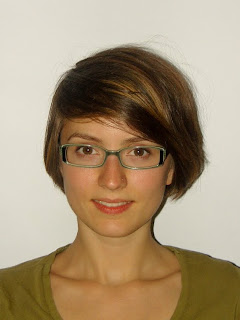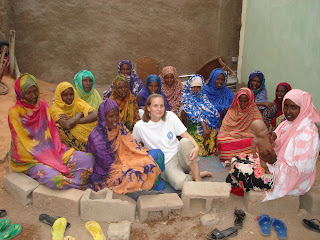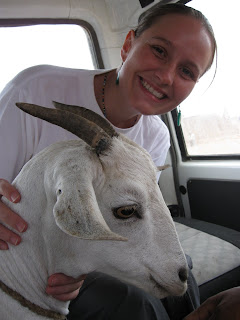Read about our volunteers in the field, as well as providing medical care for vulnerable people around the world, our volunteers are also frontline witnesses to some of the world's worst human and natural disasters.
Thursday, 17 June 2010
Sara Robbins - Bringing health care to those in desperate need on our doorstep
Sara Robbins is a 4th year medical student, Kings College London:
It’s Wednesday afternoon, and I head over to the Project:London (P:L) clinic where I volunteer as a support worker. I begin my first social consultation with Prisca*, a South African woman who has been living in the UK for five years. She begins telling me her story, explaining why she has come to the clinic, when she breaks down in tears. She is frightened. She came to London as a domestic worker with her South African employer, who abused her, took her passport, and abandoned her with nothing. After being “turned away” from an NHS Walk-in Clinic, and believing she was not allowed to register with a GP, Prisca went for years without her diabetic medication or regular checks. Over this period, her diabetes spiralled out of control, and she is now suffering from the serious sequelae of the disease.
Seeing the patients arrive at the P:L clinic has opened my eyes to the impact lack of access to health care has on vulnerable migrants, homeless people, and sex workers. In Prisca’s case, her lack of documents, poor knowledge of entitlement to care and confusion from the side of the service provider have resulted in devastating consequences to her health. From my experience at P:L, it is apparent that NHS services are becoming increasingly inflexible towards people with such diverse needs. Yet their poignant stories provide a powerful defence for their right to health, if given the opportunity to be heard.
The importance of global health is widely appreciated in medical schools across the country, and medical students are showing an ever increasing interest in the topic. However, the vast horizons of these health issues can seem overwhelming, and from my experience, many medical students feel unsure of how to help them. There is often a preconception that issues such as problems accessing health care only occur in “developing” countries while the truth is that many people are suffering on our own doorstep. I understand it is easy to be complacent about these problems, but do not underestimate the effect you can have. At the P:L clinic, I carry out social consultations with patients before they see our doctor. I also liaise with GP practices to advocate for health care for our patients, as well as directing them to appropriate legal and social services. These opportunities provide help and advice to patients. P:L also advocates for better access to health care. So you see, you don’t have to fly half way round the globe to change lives – just hop on the Central Line to Bethnal Green, and you can make the world of difference to someone like Prisca.
P:L is an advocacy service which aims to help people access health services, while providing short term health care for their current needs.
For more information about Project:London and how to volunteer, visit our website.
*Name changed for confidentiality reasons.
(This blog was originally published on the BMJ blog at http://blogs.bmj.com/bmj/)
Wednesday, 16 June 2010
Alice, Ethiopia - A positive experience
In terms of maternal health the major problems were restrictions to adequate healthcare. There was a lack of knowledge about complications and about the warning signs as well as difficulties with transportation to access the limited services. In terms of complications experienced there were a high level of problems associated with prolonged/obstructed labour often with the mothers presenting, after several days abnormal labour, at the hospital with a dead baby and a ruptured uterus. Additionally, there were high rates of maternal death from post-partum haemorrhage (as throughout the world) and again Traditional Birth Attendants (TBAs) often tried to manage these with traditional and ineffective methods and often only bringing the women to hospital when they were almost dead. Malaria is also a major health issue for the local population and is also particularly detrimental in pregnancy; during my time in this area I witnessed a maternal death from cerebral malaria.
The teaching itself was such a highlight, although challenging especially with extremely low levels of education, working with the local population was really rewarding. I particularly enjoyed making the TBAs laugh mainly with my ridiculous acting (the Somali women are generally quite reserved so it was wonderful when you see them losing their inhibitions) and getting them to participate with role plays and story telling etc..
I had very few negative experiences luckily but many very positive ones. When I think back to my time there I instantly think of the fantastic national team (about 40 people employed by Doctors of the World from cleaners to HIV counsellors) they welcomed me into their team and gave me a truly memorable experience. They also worked hard to ensure the work we were doing reached the right people.
I would say to anyone wanting to do this type of work be under no illusion that you will be saving the world, but I remain hopeful that some of the work we do can makes significant changes to peoples lives and encourages further community action. All in all I trained 130 traditional birth attendants. I would definitely go back to Africa and I’d love to visit other African countries.
Monday, 14 June 2010
Alice, Ethiopia - Working with Traditional Birth Attendants
Throughout this region most deliveries are attended at home by a Traditional Birth Attendant (TBA) and they are often the only providers of maternity care. Therefore, in the absence of other medical facilities the training of TBAs can be recognised as an important means to improve maternal health in this remote setting. In view of these factors my main assignment during this mission was to facilitate training of TBAs and monitor their activities in the region. The aim of the course was to provide TBAs with the knowledge and skills to safely manage normal birth. The course was designed to aid the identification of high risk pregnancies and potential complications in labour. With a focus on the need for early referrals; to reduce delays in women receiving appropriate medical care and the prevention of avoidable maternal deaths.
In order to reinforce the work of the TBAs within their communities it is vital to involve community elders, as they are most influential and respected members of the community. Therefore, I also undertook specific training to educate Community Elders, both from villages where Doctors of the World have trained TBAs and elders from the town itself, in issues associated with maternal mortality and how the community can work together to prevent maternal deaths.
Thursday, 10 June 2010
Alice, Ethiopia - Working in one of the most dangerous places in world
I decided to sign up for a Doctors of the World mission because I particularly liked the emphasis on long-term sustainable projects, as opposed to emergency based missions. Doctors of the World promote training local staff rather than replacing them with expatriates which definitely corresponded with my ideals. I have to admit that the fact my fiancée is French also attracted me to the organisation because I thought working for a NGO with a French connection would improve my language skills.
The Somali region is a conflict zone and there are associated risks living/working close to the Somali border so it was important to follow the security rules. I felt really safe. I actually extended my mission in Ethiopia and I was happy I was able to do something positive in this often forgotten area.
My main tasks were focused on improving maternal child health. We were based in a main town in the Somali region, with one of the only functioning hospitals, Doctors of the World with the support of the local regional health bureau are in the process of rehabilitating the hospital. Doctors of the World has a team of national inpatriate (Ethiopian staff from other areas of the country) healthcare staff based in the hospital, including midwives, and therefore as an expatriate midwife I was not required to be based in the hospital.
Tuesday, 8 June 2010
Alice Fuller, Midwife in Ethiopia
After a trip to Tanzania, Alice Fuller, a trained midwife from London, decided she wanted to use her midwifery skills abroad. She worked with Doctors of the World in 2009 in Ethiopia. Her main tasks were focused on improving maternal child health. Based in a main town in the Somali region, with one of the only functioning hospitals, Doctors of the World supports the local regional health bureau who are in the process of rehabilitating the hospital.
Alice trained traditional birth attendants with the knowledge and skills to safely manage normal birth. The course was designed to aid the identification of high risk pregnancies and potential complications in labour. There is a particular focus on the need for early referrals both to reduce delays in women receiving appropriate medical care and to prevent avoidable maternal deaths.
Subscribe to:
Comments (Atom)












